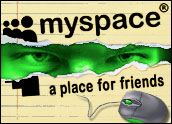
Lawmakers are ratcheting up their attempts to provide some level of protection to minors who might be victimized by online predators.
Rep. Michael G. Fitzpatrick, R-Pa., has introduced a bill that would prohibit anyone under 18 from using school or library computers to access online communities such as the wildly popular MySpace.com and other chat rooms or online forums.
If passed, the Deleting Online Predators Act (DOPA) would also require the Federal Trade Commission to create a Web site warning of the dangers such sites pose to young people — much like the consumer warnings the agency posts about risky products or prevalent scams.
The bill comes in the wake of several reports of predators caught using these sites to find and stalk underage victims.
To be sure, the Internet has been a magnet for pedophiles almost since its inception. The dangers posed by such sites as MySpace are particularly acute, though, as many of the postings provide enough identifying details for the predator to easily locate the potential victim.
51 Percent Contacted
DOPA is a good start toward addressing these problems, says Tamyra Pierce, assistant professor of mass communication and journalism at California State University, Fresno.
Pierce recently conducted a survey of teenagers and found that 51 percent of the respondents said they had been contacted by a stranger, and 10 percent had met with a stranger they first became acquainted with on online social networking sites such as MySpace.com.
Pierce surveyed 301 California students 14 to 19 years old at three high schools in Fresno and Clovis during April 2006. Eighty percent of the respondents participated in one or more social networking sites, and 38 percent said they included personal information on their site.
Perhaps most worrisome, the 14-year-old respondents reported more often than older students that they were asked to meet in person with a stranger.
Just a Start
Pierce told TechNewsWorld that these Web sites are not at the core of the problem, though, and restricting students’ access to them will not completely, or even largely, eradicate it.
“From my research, [filtering] technology has to do a better job than it does now. Several young people I interviewed told me they can easily circumvent the controls put on Internet and cable TV.”
Leaving the matter up to parents is also only a partial solution, she added, “as some parents do not get involved.”
The Web sites must step up their own protective measures as well, Pierce said, enforcing rules that one must be 18 years old to enter and deleting the nude photos available on some of the postings.
Indeed, MySpace and other sites have taken such measures — hoping, no doubt, to head off legislation that might prove to be more onerous.
Earlier this year, the company appointed Microsoft veteran and former Justice Department trial attorney Hemanshu Nigam to oversee safety, education and privacy programs and related law enforcement affairs.
It also began running public service announcements online and on TV, warning children, teenagers and their parents about the dangers lurking on the Internet.




















































